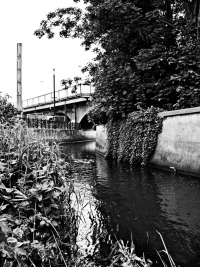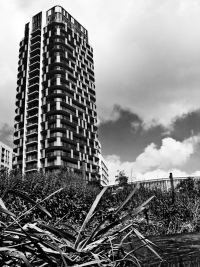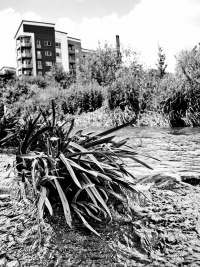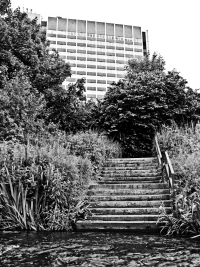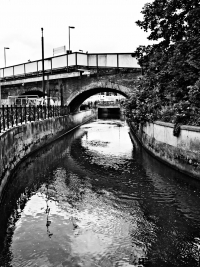The other day I went to the sorting office in Lewisham. We’d had one of those missed-delivery cards that the postman seems to drop through the door automatically, assuming we’ll be out mid-morning, mid-week. When I got there, though, there was one parcel for each of us and, because I wasn’t my fiancée, and only had my own driving licence, I couldn’t collect hers too. Irritated, I took a more meandering walk home to calm down.
I followed a path I’d not noticed before, down by the side of a boarded-up office complex. There was a seating area outside, right on the dual carriageway, like they’d been trying to encourage lunchtime team eating; that’s probably why they went out of business – people never like being encouraged to be chummy. The path led down to the Ravensbourne where it flows between low landscaped banks before scuttling off under the station on its way to the Thames. I thought there might be a point where I could scramble up to the footbridge but, rather than continuing along the water, the path abruptly ran out.
There, at the end, was a tent. And not just a tent. An upturned steel drum was acting as a rainwater butt. White brushed ash marked the site of a fire. Clothes hung from a bush, drying in the morning sun, and a rolled-up tarp suggested some more extensive waterproofing had recently been in use. Someone was living under canvas just outside Lewisham town centre.
My immediate thought was an Eastern European migrant worker, down on his luck. I don’t know why I assumed that. Possibly because I’d read something about some Estonian guys camping out in Suffolk waiting for casual labour or agricultural work to be offered.
I turned, not wanting to intrude, then heard the tent’s zipper being undone.
“Hello,” said a distinctly English voice, “fancy seeing you here.”
“Crikey,” I replied, “hello, George.”
I hadn’t seen George in about five years. He’d been a regular in one of the pubs I’d worked in. He’d always seemed a well-to-do chap, one of the ones who’d come in wearing a suit and tie on the way home from work; two pints of lager and then off to the wife, I’d assumed. He’d not been one of those more interested in self-destruction than dinner. He’d not drunk himself stupid every night only to come back the next day complaining that he wasn’t appreciated at work, that he was overdue a promotion, that it wasn’t fair that he couldn’t get on and yes, damn it, he would have another tequila chaser with his beer. Of all the people to be sleeping rough by the Ravensbourne, George seemed the most unlikely.
“Cup of tea?” he offered.
I nodded and squatted down next to some nettles while he set up a small camping gas cooker.
The flame roared while we sat in silence. It was surprisingly tranquil by the river, the babble of the water and the rustling of who-knew-what through the undergrowth distracting us from the noise of Molesworth Street.
“No milk,” he apologised.
“Black’s fine,” I said. The tea was hot and wet in that uniquely satisfying way. “George, I, I… don’t know what to say.”
“You can ask, you know? You can ask me why I’m living in a tent.”
“Okay, why are you?”
“When did we last see each other? 2008?”
“Something like that.”
“I lost my job. The firm weren’t directly hit by the financial crisis, but we kind of got caught up in the ripple. Everyone did, I guess, but we couldn’t keep our head above the water. Ten years I’d been there just for statutory redundancy. And then, well, you know what it was like. The money didn’t last. I couldn’t find work. I’m not that young anymore.” He paused and slurped his tea. “Madeline, well, she didn’t cope so well. Seemed to think we had some sort of right to paid employment. I tried to tell her, but you can guess how that conversation went. I never expected her to leave, though. That was something of a shock.”
I looked at George. He didn’t, aside from the tent, look homeless. He was clean shaven. His clothes looked recently laundered. In the porch of his tent there was a sealed, transparent plastic crate. Inside was at least a week’s worth of food: tins of tomatoes and tuna, bags of pasta, rice – a can of coconut milk, for God’s sake.
“Strangely, the week after she’d scarpered, I got a job offer. Less well-paid, a small accountancy firm in Lee, but better than nothing. Nice people. She should have waited. Should have trusted me. Still,” he smiled, cheerfully, “that was her call. And the whole thing made me think hard about life. I mean, I never intended to stay in London. It just seemed like a bit of fun. Something to do when you’re young. I always wanted to move to the countryside, do something with the land. I never wanted to work in an office at a computer all day, every day.”
He leaned back on the grassy bank and looked up to the sky. The sun was surprisingly strong after the recent downpours. George looked like he’d been missing it. His skin wasn’t yet leathery like folks who’ve toiled outside all their days, but it did have a certain robustness. He closed his eyes, as though concentrating on absorbing the rays.
“But now, who’s going to risk moving to the country? It took me over a year to get a job in London. How long would it take in the middle of nowhere? So I came up with a compromise. I put the house on the market and moved here. I kept my job, but I also get to be, I don’t know, more back-to-nature.”
“That’s, that’s,” I floundered.
“Crazy?” He looked disappointed.
“Brave,” I countered, knowing full well it could mean the same thing.
“Not really. No one knows I’m here. The winter has been mild, if somewhat wet. I guess that’s helped.”
“What do you do about being paid? Do you have a bank account? I mean, there’s so many things that you need an address for.”
“Sure, all that stuff’s registered at my cousin’s place. She lives in Charlton. And when the rain got a bit much over New Year I stayed with her for a couple of days. It was okay. Like a short holiday. But I was pleased to back here.”
“Right,” I said.
“Right,” George agreed, looking into his empty mug. “Time to go and catch the bus.”
“Oh, okay.” I handed him back my mug. “Thanks for the tea.”
“You’re welcome. Pop round anytime.”
We both walked up to the street, he turning left, I right.
A couple of days later I thought about going to see if he was still there, but part of me doesn’t want to know either way.

